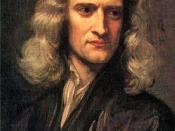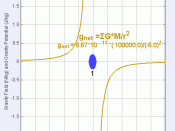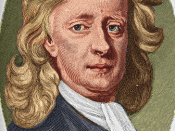Sir Isaac Newton (1642-1727), English mathematician and physicist considered one of the greatest scientists in history, who made important contributions to many fields of science. His discoveries and theories laid the foundation for much of the progress in science since his time. Newton was one of the inventors of the branch of mathematics called calculus (the other was German mathematician Gottfried Wilhelm Leibniz). He also solved the mysteries of light and optics, formulated the three laws of motion, and derived from them the law of universal gravitation. See Gravitation; Mechanics.
Newton was born on December 25, 1642 (according to the Julian calendar then in use; the date was January 4, 1643, according to the Gregorian calendar in use today), at Woolsthorpe, near Grantham in Lincolnshire. When he was three years old, his widowed mother remarried, leaving him in the care of his grandmother. Eventually his mother, by then widowed a second time, was persuaded to send him to grammar school in Grantham.
Later, in the summer of 1661, he was sent to Trinity College, at the University of Cambridge.
Newton received his bachelor's degree in 1665. After an intermission of nearly two years to avoid the plague, Newton returned to Trinity, which elected him to a fellowship in 1667. He received his master's degree in 1668. Newton ignored much of the established curriculum of the university to pursue his own interests: mathematics and natural philosophy. Proceeding entirely on his own, he investigated the latest developments in mathematics and the new natural philosophy that treated nature as a complicated machine. Almost immediately, he made fundamental discoveries that were instrumental in his career in science.
The Fluxional Method
Newton's first achievement was in mathematics. He generalized the methods that were being used to draw tangents to curves and to calculate the...


